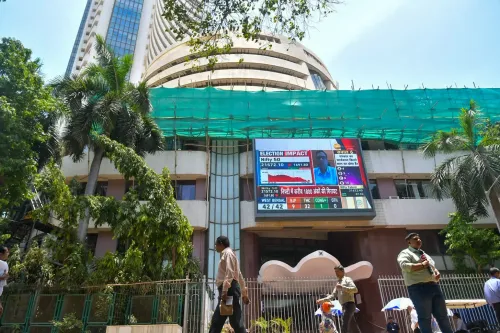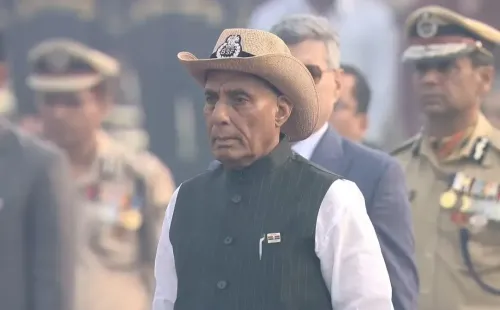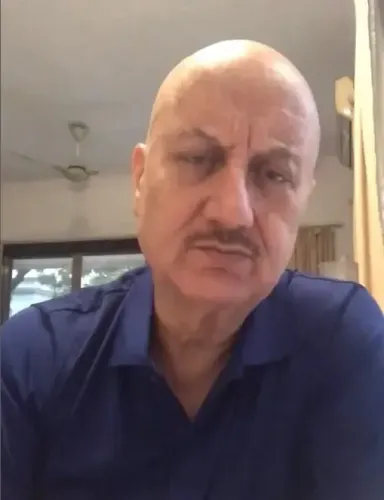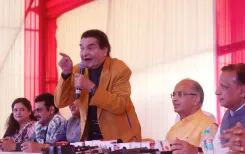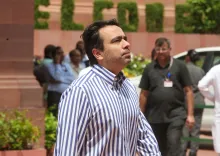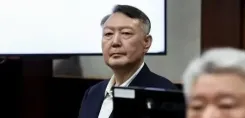What Did German FM Wadephul Discuss with PM Modi?

Synopsis
Key Takeaways
- Germany appreciates India's call for a ceasefire in Ukraine.
- Both nations aim to strengthen strategic partnerships.
- Focus on collaboration in security, defence, and economy.
- Wadephul emphasizes the importance of technology and innovation.
- Over 64,000 visa applications filed in Bengaluru.
New Delhi, Sep 3 (NationPress) The visiting German Foreign Minister Johann Wadephul met with Prime Minister Narendra Modi in New Delhi on Wednesday, expressing his appreciation for India’s initiative to seek an end to the ongoing conflict in Ukraine. Wadephul emphasized that both India and Germany are committed to enhancing their strategic partnership across multiple sectors, particularly in security, defence, economy, trade, and skilled labour.
“I had insightful discussions with Narendra Modi today. Our nations are taking significant steps to strengthen our strategic partnership, especially in areas such as security, defence, economy, trade, and skilled labour. We greatly value India’s call for a ceasefire in Ukraine,” Wadephul shared on X following their meeting.
Earlier, Wadephul had discussions with External Affairs Minister (EAM) S Jaishankar at the Hyderabad House. The two leaders supported enhanced collaboration in industries, talent mobility, digital technologies, semiconductors, and critical technologies.
EAM Jaishankar commended Germany's strong commitment to fostering closer ties between India and the European Union (EU) and its proactive efforts to finalize the Free Trade Agreement (FTA).
“We held comprehensive discussions about our bilateral agenda in preparation for the upcoming round of Inter-Governmental Consultations in India. We explored opportunities for collaboration in industries, talent mobility, digital technologies, semiconductors, and critical technologies. I appreciate Germany’s strong advocacy for closer India-EU relations and its efforts in concluding the FTA. We also exchanged perspectives on our multilateral cooperation regarding global issues, including the conflict in Ukraine, the situation in Middle East/West Asia, and the Indo-Pacific,” Jaishankar tweeted.
On Tuesday, Wadephul arrived in New Delhi after his engagements in Bengaluru. In a statement on Facebook, he referred to India as a “key strategic partner” for Germany and characterized “tech hub Bengaluru” as the “engine of economic power.”
Wadephul noted in a statement from the German Foreign Ministry, “India is the largest democracy and most populous country globally, and serves as a key strategic partner for Germany politically, scientifically, culturally, and economically. The tech hub Bengaluru is the core of this economic powerhouse. My visit to this vibrant metropolis underscored this reality, where technology, innovation, and knowledge exchange thrive together. Both India and Germany benefit from this collaboration.”
He highlighted examples such as the largest development center of Mercedes-Benz outside Germany, employing over 8,500 individuals focused on future innovations. He also inaugurated a new Experience Center at the SAP campus, symbolizing the strong German-Indian technology partnership.
Furthermore, he visited the Indian Space Research Organisation (ISRO) and the Indian Institute of Science in Bengaluru, noting that India is making substantial investments in research and high-tech fields.
“During my visit to ISRO's satellite test center and the Indian Institute of Science, it was evident that India is heavily investing in research and high-tech initiatives, seeking cooperation with Germany,” he remarked.
Wadephul also noted interactions with German learners at the Goethe-Institute and staff from the Consulate General, highlighting the interest of many skilled professionals from India in pursuing opportunities in Germany. Over 64,000 visa applications were submitted in Bengaluru in 2024 alone. Knowledge of German, along with training and openness, are essential to leverage this potential. Our goal is to establish the appropriate framework for professionals, students, companies, and collaborative innovations,” he concluded.

